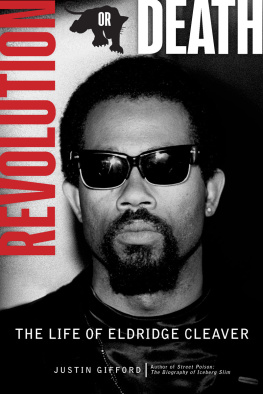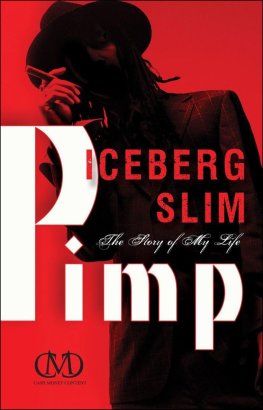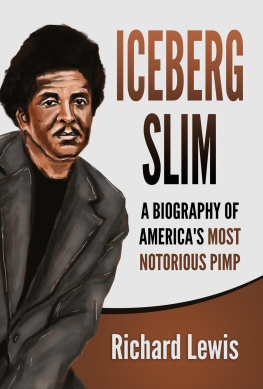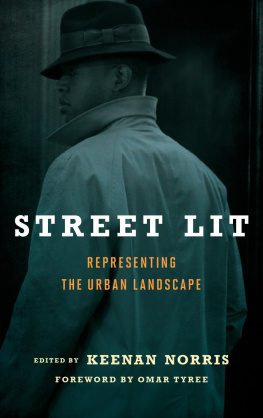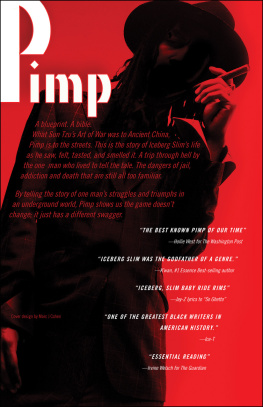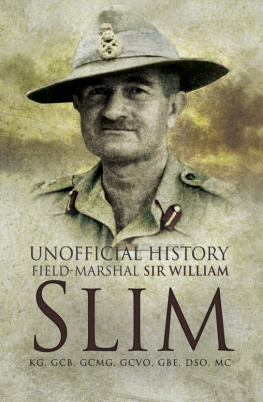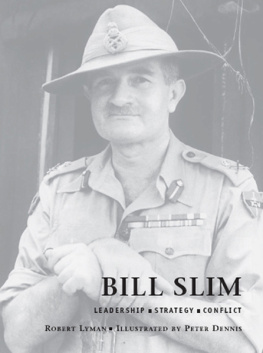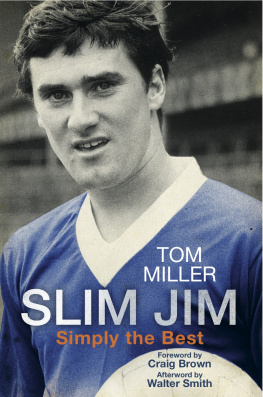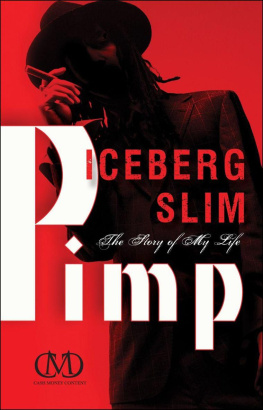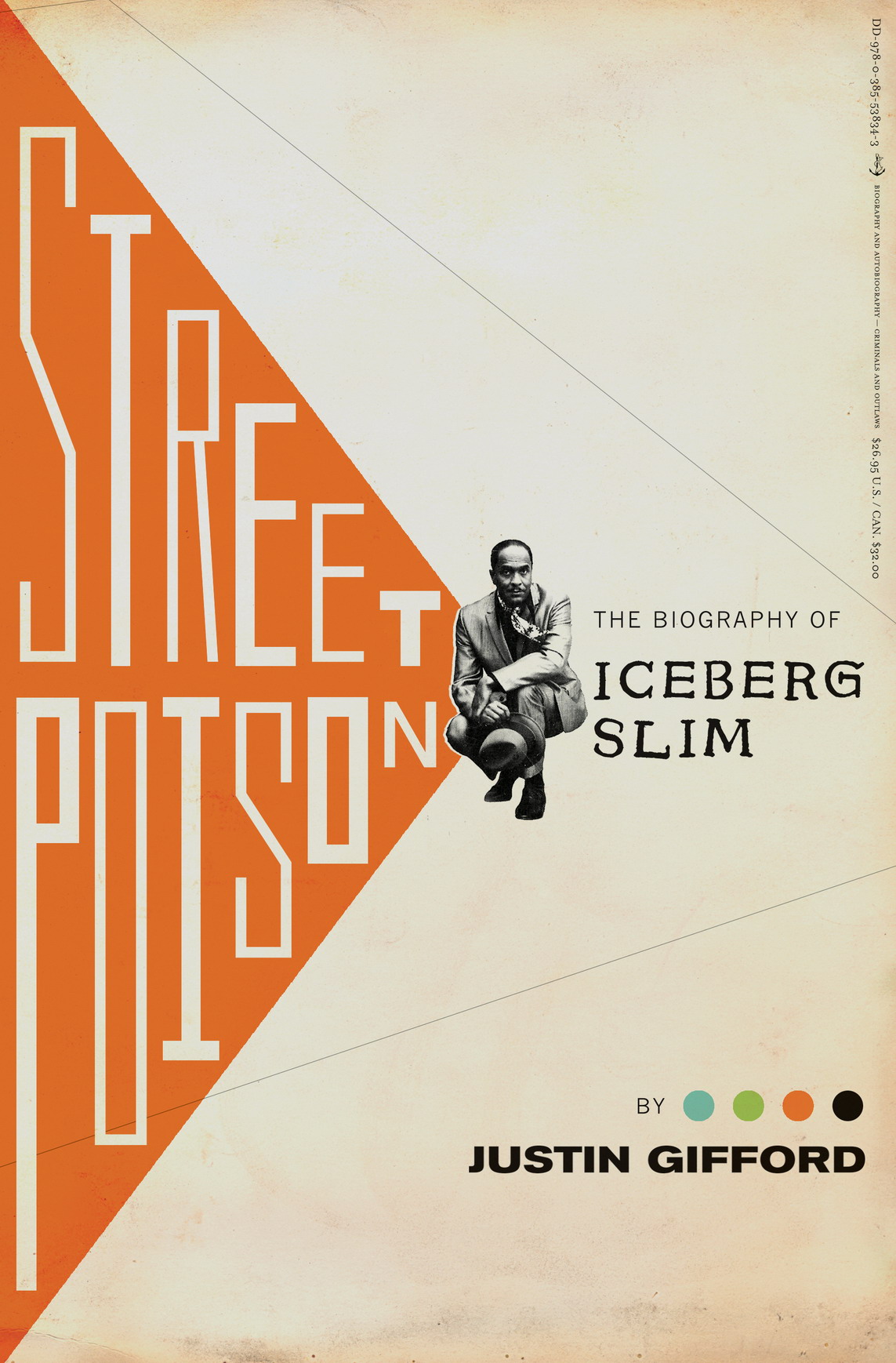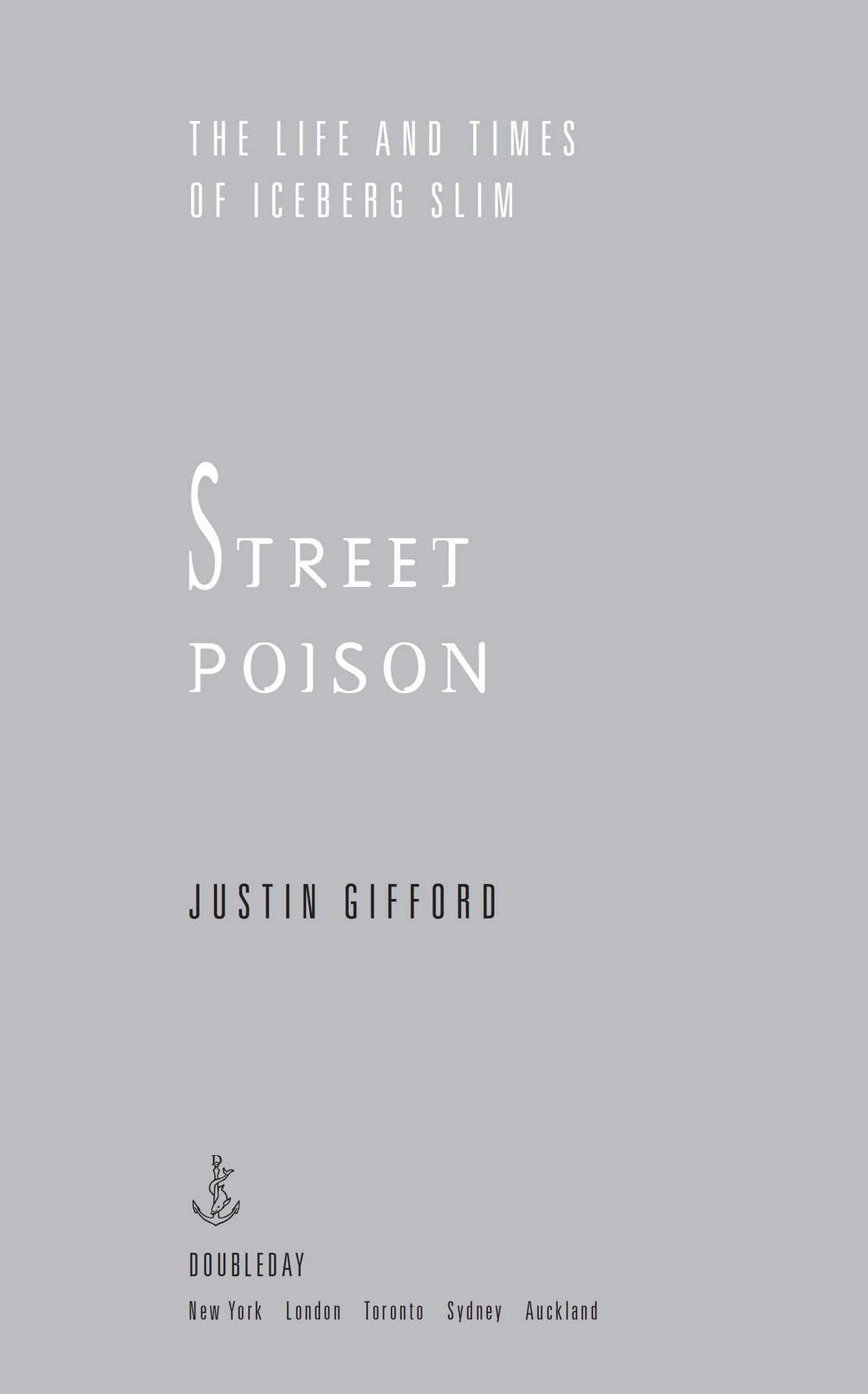Contents
Also by Justin Gifford
Pimping Fictions: African American Crime Literature and the Untold Story of Black Pulp Publishing
Copyright 2015 by Justin Gifford
All rights reserved. Published in the United States by Doubleday, a division of Penguin Random House LLC, New York, and distributed in Canada by Random House of Canada Ltd., Toronto.
www.doubleday.com
DOUBLEDAY and the portrayal of an anchor with a dolphin are registered trademarks of Penguin Random House LLC.
eBook design adapted from printed book design by Maria Carella
Frontispiece photograph courtesy of Holloway House
Cover design by Michael J. Windsor
Cover image: photo of Iceberg Slim courtesy of Diane Beck
Library of Congress Cataloging-in-Publication Data
Gifford, Justin.
Street poison : the biography of Iceberg Slim / Justin Gifford.
pages cm
ISBN 978-0-385-53834-3 (hardcover)ISBN 978-0-385-53838-1 (eBook)
1. Iceberg Slim, 19181992. 2. African American authorsBiography.
3. African AmericansIllinoisChicagoBiography. 4. PimpsIllinoisChicagoBiography. I. Title.
PS3552.E25Z64 2015
813.54dc23
2014037252
eBook ISBN9780385538381
v4.1
a
FOR MY SISTER, JESSIE GIFFORD,
the most courageous woman I have ever known
So, as I started to read that Iceberg Slim, I started to learn how to quote it, you know, all his little poetry and stuff. I was branded the beast, I sat down at the feast, you know what Im saying? So I would say it, and my friends would say, Say some more of that Iceberg stuff, T. Drop that Iceberg stuff, T.
ICE-T
Iceberg Slims Pimp: The Story of My Life was the book that determined the ghetto persona, which has massively influenced popular culture through music and film. In terms of that influence hes probably the most dominant writer since Shakespeare.
IRVINE WELSH
Iceberg SlimTruth, still shining down.
ANDREW VACHSS
CONTENTS
PREFACE
R obert Iceberg Slim Becka pimp for twenty-five years, who went on to become a writer of bestselling paperback originals, including Pimp: The Story of My Lifemight at first glance seem like an appalling choice for a biography. After all, he abused hundreds of women throughout his lifetime, and he is practically unknown to the American mainstream. His books, which were marketed as trashy pulp fiction, have been sold in mom-and-pop stores in inner-city neighborhoods, and they have been read primarily in Americas forgotten corners: prisons, ghettos, and military bases. However, Beck has had an enormous influence on contemporary black music, film, literature, and popular culture. Starting in the late 1960s, his pen name, Iceberg Slim, became synonymous with black urban cool, and entire cultural industries grew up around his work. He is arguably one of the most influential figures of the past fifty years, and yet, apart from what he reveals in his own writings, very little is known about this fascinating and contradictory character.
I encountered Becks influence many times, and in many forms, before I comprehended his significance as a writer and cultural force. Growing up in a working-class family in Seattle during the age of Reaganomics, I listened to as much gangsta rap as grunge. In my twenties, I developed a manic, obsessive relationship to underground American literature. I dropped out of college for a while in an attempt to write the next great American novel, and after reading Jack London, John Steinbeck, and Jack Kerouac, I hitchhiked from Seattle through parts of Mexico and the American South to New York. I constructed a giant cartoonish thumb out of cardboard and duct tapeit was the size of a medieval shieldand I set out to have my own reckless literary adventure on the road. It was a dangerous trip, full of peril, but the road was full of transgressive pleasures, too. Someday I intend to write about it.
It was on that trip to New York that I made a discovery that would pay off many years later in my search for Becks books. I was walking down Lenox Avenue after eating a plate of chicken and waffles at Sylvias, the famous soul food restaurant, when I spied a table on the corner of 125th Street piled high with books. I was on the hunt for Beat literature, so I stopped to scan the selection. I didnt see anything I was looking for, just some beat-up paperbacks with lurid cover illustrations and names I didnt recognize. To be honest, in my ignorance of African American crime literature, I failed to see the archive of literary treasures that sat before me. It would be a full seven years before I would return to this street to discover the works of Beck and the genre he inspired.
I first heard Becks name when I moved to his old stomping grounds on the South Side of Chicago a few years later. My research had become more focused on issues of race in American literature, and I had come to the University of Chicago to study under, among other brilliant writers, Nobel Prizewinning author Toni Morrison. My life in Chicago was divided between two worlds. In the mornings, I took classes from intellectual luminaries such as Homi Bhabha, Terry Eagleton, and Morrison herself. In the afternoons, I worked in the Chicago public schools as a technology coordinator, helping teachers integrate computer and Internet technology into the classroom. I worked at nine schools located throughout Chicagos economically devastated South Side; the schools lacked basic necessities such as desks and textbooks, and many of the students lived in public housing projects, like the notorious Robert Taylor Homes.
One day I was working with a group of teenagers who asked me what I studied at the university. I told them that I read the classics of African American literature, Zora Neale Hurston, Richard Wright, and Ralph Ellison. They admitted that while they knew of these writers, they were more interested in the books of a former pimpturnedwriter from Chicago named Iceberg Slim. One of them produced a dog-eared copy of Pimp, and I thumbed through the autobiography for a few minutes before the teacher came back into the room. In those brief few moments, I didnt really understand what I was looking at. The gold cover had Pimp emblazoned in purple letters across the front and a hand-drawn silhouette of a mans hardened face underneath. It reminded me of a Harlequin-style romance novel. Here again, I missed an opportunity to expand my knowledge of African American literature. Pimp was certainly not being taught or read at the University of Chicago, and I was so focused on my research of the canon, I forgot all about the book for the next five years.
Finally, in the summer of 2003, I made a discovery that would entirely change the direction of my lifes work. I was now a PhD candidate at the University of Virginia, and I was composing a dissertation on crime and detective fictionEdgar Allan Poe, Mark Twain, Raymond Chandler, Dashiell Hammett, and Chester Himes. I had come to New York City to search for rare and out-of-print copies of paperback books; those were the days when used bookstores still survived in Manhattan. I was particularly interested in tracking down the works of Chester Himes, the only African American detective novelist that I knew of. I haunted the usual spotsthe Strand on Broadway, The Mysterious Bookshop, the Hue-Man Bookstore in Harlemand then I remembered the book table that I had encountered years earlier. The table was no longer there on 125th and Lenox; but down 125th Street, in front of the Apollo Theater, there was another table, stacked with black-authored paperback novels. They had garish, blaxploitation-style covers, with exaggerated drawings of pimps and gangsters, and prostitutes busting out of their skimpy outfits. I was fascinated with the titles, such as


